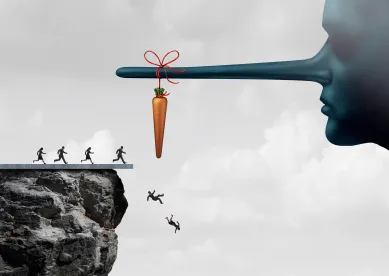There have been two recent developments regarding the False Claims Act (FCA) which will impact health care organizations that could be subject to a whistleblower lawsuit or FCA investigation. First, on May 7, 2019, the Department of Justice (DOJ) issued formal guidance regarding the manner in which the DOJ would award credits to defendants that cooperate with the DOJ during an FCA investigation (the Policy). Second, on May 13, 2019, the United States Supreme Court unanimously ruled whistleblowers (qui tam relators) can bring lawsuits under the FCA for up to 10 years after the alleged FCA violation if the relator files suit within three years of a responsible government official learning of the alleged fraud.
New Cooperation Credit Guidance for False Claims Investigations
Under the new DOJ Policy, cooperation credit in FCA cases may be earned by voluntarily disclosing misconduct unknown to the government, cooperating in an ongoing investigation, or undertaking remedial measures in response to a violation. The Policy outlining the requirements for cooperation credit is available here.
Voluntary Self-Disclosure
The Policy states entities or individuals that make “proactive, timely, and voluntary self-disclosure” to the DOJ regarding misconduct that could lead to previously unknown false claims and fraud will receive credit during the resolution of an FCA case. Moreover, entities or individuals may discover additional misconduct going beyond the scope of known concerns and the voluntary self-disclosure of such additional misconduct that qualify the entity for credit. The DOJ also states a company may earn credit by preserving relevant documents and information beyond existing business practices or legal requirements, identifying individuals who are aware of relevant information or conduct, and facilitating review and evaluation of data or information that requires access to special or proprietary technologies.
Other Forms of Cooperation
In addition to voluntarily self-disclosing misconduct, an individual or entity can earn credit by taking steps to cooperate with an ongoing government investigation. The DOJ has noted the measures listed below are the type of activities by entities or individuals under a DOJ investigation that will be taken into account to earn credit. However, this is not an exhaustive list of measures, the measures are not mandatory, and an entity or individual does not have to satisfy all of them to qualify for at least partial cooperation credit.
-
Identifying individuals substantially involved in or responsible for the misconduct;
-
Disclosing relevant facts and identifying opportunities for the government to obtain evidence relevant to the government’s investigation that is not in the possession of the entity or individual or not otherwise known to the government;
-
Preserving, collecting, and disclosing relevant documents and information relating to their provenance beyond existing business practices or legal requirements;
-
Identifying individuals who are aware of relevant information or conduct, including an entity’s operations, policies, and procedures;
-
Making available for meetings, interviews, examinations, or depositions an entity’s officers and employees who possess relevant information;
-
Disclosing facts relevant to the government’s investigation gathered during the entity’s independent investigation (not to include information subject to attorney-client privilege or work product protection), including attribution of facts to specific sources rather than a general narrative of facts, and providing timely updates on the organization’s internal investigation into the government’s concerns, including rolling disclosures of relevant information;
-
Providing facts relevant to potential misconduct by third-party entities and third-party individuals;
-
Providing information in native format and facilitating review and evaluation of that information if it requires special or proprietary technologies so the information can be evaluated;
-
Admitting liability or accepting responsibility for the wrongdoing or relevant conduct;
-
Assisting in the determination or recovery of the losses caused by the organization’s misconduct;
-
Notifying a relevant agency about an entity’s or individual’s disclosure, other cooperation, or remediation, so that the agency in its discretion may consider such factors in evaluating its administrative options, such as suspension, debarment, exclusion, or civil monetary penalty decisions;
-
Publicly acknowledging the entity’s or individual’s disclosure, other cooperation, or remediation; and
-
Assisting the entity or individual in resolving qui tam litigation with a relator or relators.
Cooperation does not include disclosure of information required by law, or merely responding to a subpoena, investigative demand, or other compulsory process for information. Cooperation also does not include the disclosure of information under an imminent threat of discovery or investigation. However, cooperation credit may be awarded when an entity or individual meaningfully assists the government’s investigation by, for example, disclosing additional relevant documents or information, or otherwise proactively aiding the government in understanding the context or significance of the documents or information produced.
Additionally, under the Policy, the DOJ will take into account corrective action a company has taken in response to an FCA violation. Such remedial measures may include undertaking a thorough analysis of the root cause of the misconduct, appropriately disciplining or replacing those responsible for the misconduct, accepting responsibility for the violation, and implementing or improving compliance programs to prevent a recurrence.
In considering the value of any voluntary disclosure or additional cooperation, the DOJ will consider the following factors: (1) the timeliness and voluntariness of the assistance; (2) the truthfulness, completeness, and reliability of any information or testimony provided; (3) the nature and extent of the assistance; and (4) the significance and usefulness of the cooperation to the government.
Credit for Disclosure, Cooperation and Remediation
The DOJ notes in order to earn a maximum credit in an FCA matter, the entity or individual should make a timely self-disclosure. Additionally, all individuals substantially involved or responsible for the actions that lead to the misconduct should be identified. The individual or entity must provide full cooperation with the government’s investigation and take remedial steps intended to prevent similar wrongdoings in the future. Partial credit may be obtained if there is meaningful assistance with the government’s investigation by fulfilling a measure that qualifies for cooperation credit. The DOJ has full discretion to reward such credit by reducing the penalties or treble damages sought by the DOJ. However, the maximum credit may not exceed an amount that would result in the government receiving less than full compensation for the losses caused by the individual or entity’s conduct.
Supreme Court Determines False Claims Cases Have 10 Year Statute of Limitations
The decision in Cochise Consultancy, Inc. v. United States ex rel. Hunt, unanimously affirms the Eleventh Circuit’s holding (887 F.3d 1081) that the 31 U.S.C. § 3731(b)(2) tolling provision applies to FCA qui tam actions regardless of whether the government intervenes. We previously wrote about the Supreme Court’s holding in detail here.
In Cochise, the Supreme Court decided which statute of limitation applies to qui tam actions as an FCA action may not be brought: (1) more than six years after the date on which the FCA violation is committed, 31 U.S.C. § 3731(b)(1), or (2) “more than 3 years after the date when facts material to the right of action are known or reasonably should have been known by the official of the United States charged with responsibility to act in the circumstances, but in no event more than 10 years after the date on which the violation is committed,” 31 U.S.C. § 3731(b)(2).
The Court first held that relators may take advantage of the tolling provision even when the government elects not to intervene. The Court also held it is the government’s knowledge — not the plaintiff's knowledge — that triggers the statute of limitations period in 31 U.S.C. § 3731(b)(2), as the statute refers to knowledge of a United States government official. The Court's unanimous decision would appear to allow relators to take advantage of a tolling provision that grants an additional three years to bring FCA suits, now allowing relators up to 10 years within which to file their FCA lawsuits.
The Cochise decision will impact health care organizations as there is now expanded potential for exposure to FCA lawsuits due to this longer lookback period. Claims submitted to government payors will now have a lookback period of up to 10 years rather than the six years that was the standard prior to the Supreme Court’s decision. We will continue to monitor how the lower courts apply the Supreme Court decision in Cochise to FCA cases going forward. Health care providers will need to revisit their policies and practices in light of Cochise.




 />i
/>i

